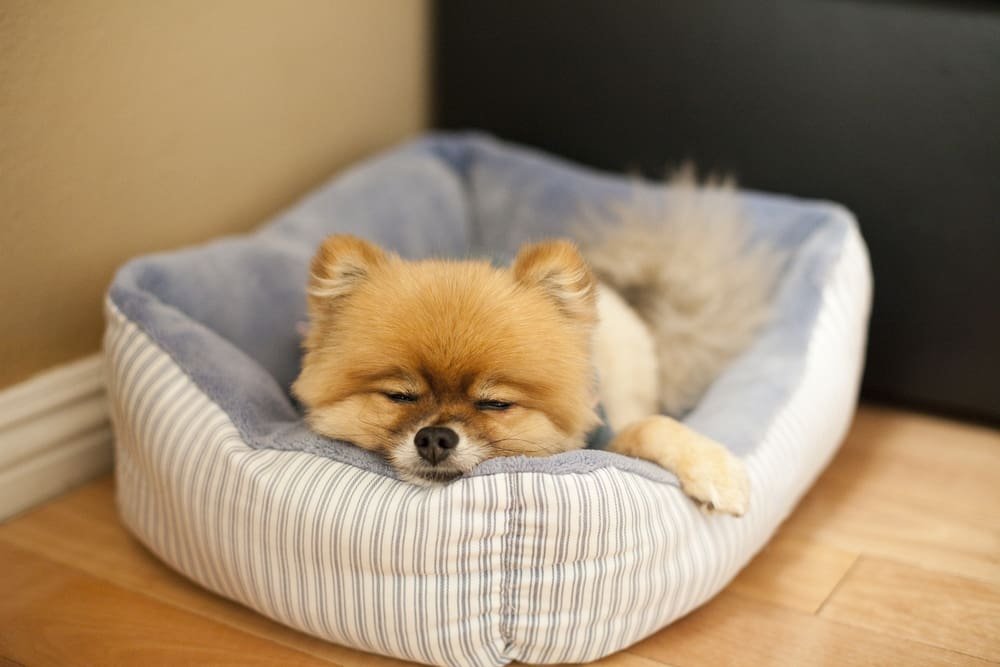Table of Contents
Have you ever wondered about the pomeranian sleeping pattern? Well, get ready to dive deep into the sleep patterns of these adorable little furballs! This article will explore everything you need to know about pomeranian sleeping habits.
Pomeranians are known for their petite size and prominent personalities, but they have some interesting habits when it comes to sleep. These fluffy canines have a natural affinity for comfort, and you’ll often find them curled up in the coziest spots in your home. But their sleep patterns go beyond just finding a comfy place.
The Importance Of Pomeranian Sleeping Dogs
Just like humans, sleep is crucial for the overall well-being of dogs, including Pomeranians. During sleep, a dog’s body repairs itself, and their brain processes the information gathered throughout the day. It also helps maintain a healthy immune system and balance their energy levels.
Understanding the Pomeranian Sleeping can help us provide them with the right environment and ensure they get the restful sleep they need.

How Much Sleep Do Pomeranians Need?
Pomeranians have a unique sleep pattern compared to other dog breeds. On average, they require about 12 to 14 hours of sleep daily. However, this can vary depending on age, activity level, and overall health. Puppies and older Pomeranians may need more sleep, while younger adults require slightly less.
It’s important to note that Pomeranians have short bursts of intense activity, and their sleep routine reflects this. They can fall asleep quickly and easily, but they may also wake up suddenly and get back to their energetic self. These brief periods of wakefulness are regular for Pomeranians and should not be a cause for concern.
Signs Of a Healthy Sleep Pattern In Pomeranians
A healthy sleep pattern is essential for Pomeranians to maintain their overall well-being. Here are some signs that indicate your Pomeranian is getting the right amount of quality sleep:
- Relaxed posture: When your Pomeranian is in a deep sleep, their body will be fully relaxed, and their breathing will be slow and steady. Their eyes may also be closed or only slightly open.
- No excessive movement: During sleep, Pomeranians may twitch or move their legs occasionally, which is normal. However, excessive movement or restlessness could indicate an underlying issue.
- Regular sleep schedule: Pomeranians thrive on routine, so having a consistent sleep schedule can help them establish healthy sleep patterns. Try to maintain regular bedtimes and wake-up times for your furry friend.
Suppose you notice significant changes in your Pomeranian sleeping patterns, such as excessive sleepiness, difficulty falling asleep, or persistent restlessness. In that case, it’s essential to consult a veterinarian to rule out any underlying health problems.

Common Sleep Problems in Pomeranians
While Pomeranians generally have no trouble falling asleep, a few common sleep problems can affect them. These issues can disrupt their sleep patterns and lead to behavioral and health problems if left unaddressed.
Let’s take a look at some of these sleep problems:
- Insomnia: Pomeranians may experience difficulty falling or staying asleep, leading to a lack of quality rest. This can be caused by various factors such as anxiety, discomfort, or underlying health conditions.
- Sleep apnea: Sleep apnea is a condition where a dog’s breathing is interrupted during sleep. Pomeranians with sleep apnea may snore loudly, gasp for air, or exhibit other signs of breathing difficulties during sleep.
- Restless leg syndrome: Pomeranians can experience restless leg syndrome, which causes them to move their legs during sleep constantly. This can disrupt their sleep and lead to daytime sleepiness.
Creating a Comfortable Sleep Environment For Your Pomeranian
A comfortable sleep environment is essential for your Pomeranian to have a restful night’s sleep. Here are some tips to create the perfect sleeping space for your furry friend:
- Cozy bed: Invest in a comfortable, supportive bed for small dogs like Pomeranians. Look for beds with orthopedic features to provide extra support for their joints.
- Temperature control: Pomeranians are sensitive to temperature, so make sure their sleeping area is neither too hot nor too cold. Keep them away from drafts and provide blankets or cooling mats, depending on the weather.
- Quiet and dark: Pomeranians are easily disturbed by noise and light, so create a quiet and dark environment for them to sleep in. Use blackout curtains or a white noise machine to block out external disturbances.
Establishing a Bedtime Routine For Your Pomeranian
Establishing a consistent bedtime routine can help signal your Pomeranian that it’s time to wind down and prepare for sleep.
Here are some steps you can incorporate into their bedtime routine:
- Exercise: Engage your Pomeranian in some light exercise or playtime before bedtime. This can help tire them out and expend any excess energy, making it easier for them to relax and fall asleep.
- Calming activities: Engage in calming activities such as gentle brushing or massage to help your Pomeranian relax before bedtime. This can also strengthen the bond between you and your furry friend.
- Dim the lights: Lower the lights in your home as bedtime approaches. This helps create a soothing atmosphere and signals to your Pomeranian that it’s time to prepare for sleep.
Tips For Addressing Sleep Problems In Pomeranians
If your Pomeranian is experiencing sleep problems, there are several strategies you can try to address these issues:
- Rule out medical conditions: Consult a veterinarian to rule out any underlying health conditions affecting your Pomeranian sleeping. They can provide guidance and recommend appropriate treatment if necessary.
- Create a consistent sleep schedule: Establishing a consistent sleep schedule can help regulate your Pomeranian sleeping patterns. Stick to regular bedtimes and wake-up times, even on weekends.
- Provide comfort and security: Ensure your Pomeranian feels safe and secure in their sleeping area. Use anxiety-reducing products such as calming sprays or pheromone diffusers to create a soothing environment.
Consulting a Veterinarian for Sleep-Related Issues
If your Pomeranian sleeping problems persist or worsen despite your best efforts, it’s crucial to consult a veterinarian. They can thoroughly examine and provide personalized advice based on your Pomeranian’s needs. Remember, addressing sleep-related issues promptly can help improve your furry friend’s overall quality of life.
Conclusion: Pomeranian Sleeping Pattern
Understanding the sleep patterns of Pomeranians is essential for providing them with the right environment and ensuring they get the restful sleep they need. By creating a comfortable sleep space, establishing a bedtime routine, and addressing any sleep problems promptly, you can promote better sleep for your beloved Pomeranian. So, next time you see your sleeping beauty curled up in their cozy spot, you’ll know just how vital their sleep is for their overall well-being.
